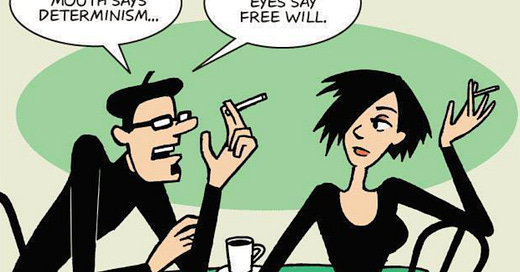Ilangho: Robert, are you a votary of free will or destiny?
Robert: That kind of question depends entirely on what is meant by the word "you," Ilangho.
Ilangho: An ordinary human being. With a body and mind.
Robert: OK. In that case, there may be a limited area in which choice is possible (or not), but who I am today was never chosen. It is the outcome of being born with a certain body and brain, at a certain time and place, into a certain family with certain values and ideas, embedded in a certain culture that demands acquiescence to its rules and mores, etc. I never chose one iota of that. You can call that "destiny" if you like that word, but I don't like that word because it has connotations of something preordained, which is not what I mean.





Three things I find very interesting about freewill (or not):
1. Freewill is an appearance in "what is" just like my nose is, my most private thought is, and the clouds are. There is no way to distinguish one thing from another in a fundamental way.
2. I always found the question of freewill moot because how would I tell the appearance of freewill (I can click submit on this or not, freely) from the "actuality" of freewill? There's no difference that I can see.
3. Most importantly, we SEEM to have freewill, so we must act like we do. If we don't, we are not honoring (taking fully into account) our actual lived experience. We are denying or ignoring an unavoidable and incontrovertible aspect of what it means to be experiencing this aliveness.
An old post but I've only just read your chapter on free-will and had some thoughts.
'Choose' as a verb seems absurd given my understanding of what you said in the chapter.
It occurs to me that a good example of how much 'choosing' we do or do not do is demonstrated viscerally in who we find physically attractive or not.
Given a choice of a number of people that I'd never seen before to take out on date, for example (I'm married, happily, so this is purely hypothetical), I'd 'choose' the one I found most attractive, no thought required. Over and over again I'd make the same 'choice' because that's the wiring I had at that point in time. Rinse, repeat, same result and infinitum.
So rather than 'choices' they are simply possibilities? There is a choice of X number of possibilities but I don't 'choose' one. In fact they are only possibilities to everyone else observing the process. For me they wouldn't even be that.
Am I grasping this concept as intended?